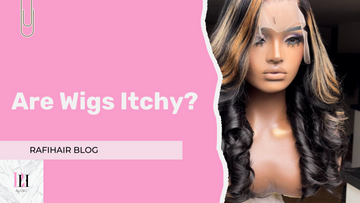
Introduction
Wigs are fantastic for switching up your look without committing to a drastic haircut or color change. However, one common concern among wig wearers is itchiness. Are wigs itchy, and what can you do about it? Let's dive into the factors that contribute to wig itch and how you can alleviate this discomfort.
What Causes Itchiness:
Materials
The material of your wig plays a significant role in whether it causes itchiness or not. Synthetic wigs, while more affordable, can be prone to itchiness due to their less breathable nature compared to natural hair wigs. Additionally, some individuals may have sensitivities to certain synthetic materials.
Construction
The construction of the wig cap can also impact itchiness. Caps that are too tight or poorly ventilated can trap heat and sweat against the scalp, leading to irritation and itchiness. Opting for wigs with adjustable straps and breathable caps can help alleviate this issue.
Hygiene
Poor hygiene practices can exacerbate itchiness. If you don't clean your wig regularly, oils, sweat, and product buildup can accumulate, leading to scalp irritation. It's essential to follow proper cleaning and maintenance routines to keep your wig and scalp clean and healthy.
Tips for Reducing Itchiness:
Proper Care
Regularly washing and conditioning your wig can help keep it clean and free from irritants that can cause itchiness. Use products specifically designed for wigs to avoid damaging the fibers and cap.
Scalp Hydration
Keeping your scalp hydrated can also minimize itchiness. Consider using a moisturizing spray or scalp treatment to soothe dryness and irritation. Additionally, wearing a wig cap underneath your wig can provide an extra layer of protection and hydration for your scalp.
Cleaning
In addition to washing your wig, it's essential to clean your scalp regularly to prevent buildup of oils and sweat. Use a gentle cleanser formulated for sensitive skin to avoid stripping your scalp of its natural oils.
Choosing the Right Wig:
Material Considerations
If you're prone to itchiness, opt for wigs made from natural hair or high-quality synthetic fibers that mimic the look and feel of real hair. These materials are often more breathable and comfortable for extended wear.
Wig Cap Types
Consider the type of wig cap when choosing a wig. Caps with lace fronts or monofilament tops provide more ventilation and a more natural-looking scalp, reducing the likelihood of itchiness.
Breathability
Choose wigs with breathable caps that allow airflow to the scalp. Avoid caps that are too tight or restrictive, as they can trap heat and sweat, leading to discomfort and itchiness.
Wig Fit
Ensure your wig fits properly to avoid unnecessary pressure and friction on the scalp, which can cause irritation and itchiness. Adjust the straps or seek professional assistance to achieve the perfect fit.
Styling
Avoid over-styling your wig with heat tools or excessive product, as this can lead to buildup and irritation. Opt for gentle styling methods and products formulated specifically for wigs to maintain scalp health and minimize itchiness.
Conclusion
In conclusion, while some wigs may cause itchiness, there are several steps you can take to minimize discomfort and enjoy wearing your wig to the fullest. By choosing the right materials, maintaining proper hygiene, and selecting a well-fitting wig, you can reduce itchiness and feel confident in your new look.
FAQs
1. How often should I wash my wig to prevent itchiness?
It's recommended to wash your wig every 6-8 wears or as needed, depending on your activity level and exposure to sweat and oils.
2. Can I use regular shampoo and conditioner on my wig?
It's best to use products specifically designed for wigs to avoid damaging the fibers and cap. Regular shampoo and conditioner may contain harsh ingredients that can strip the wig's color and texture.
3. Are there any home remedies for relieving wig itch?
Some people find relief from itchiness by applying aloe vera gel or coconut oil to the scalp. However, it's essential to patch test these remedies to ensure they don't cause further irritation.
4. Why does my wig itch more in hot weather?
Heat and sweat can exacerbate itchiness by creating a breeding ground for bacteria and yeast on the scalp. Opt for breathable wigs and scalp treatments to minimize discomfort in hot weather.
5. Is it normal for wigs to itch when you first start wearing them?
It's not uncommon for wigs to cause some initial discomfort as your scalp adjusts to wearing them. However, persistent itchiness may indicate an issue with the fit or materials of the wig.
